The Preston Guardian, Saturday, April 22, 1865
OPENING OF THE LYTHAM PIER.
Monday last was a great day at Lytham. That favourite watering place had
never before within its boundaries so large a number of visitors, and never was it on any
previous occasion the scene of a ceremony of so interesting and attractive a character. Lytham
has long been a favourite place for the inhabitants of Preston and of the other manufacturing
towns of Lancashire and Yorkshire to resort to during the summer months in search of health or
recreation, and of late years it has been in great favour as a place of residence for retired
tradesmen, and for persons still in business, who can afford to live at a distance from their
works and counting houses, and travel to and from their marine villas by rail.
As Lytham has, year by year, shown evidences of increasing public favour, there
have been efforts, on the part of the inhabitants to render the town worthy of its advanced
position ; its houses have been improved in style and accommodation ; hotels have been built and
fitted up in a way calculated to meet modern requirements; baths have been erected; an elegant
assembly-room has been constructed; churches and chapel have risen and all that modern refinement
seeks at a fashionable watering place is found at Lytham.
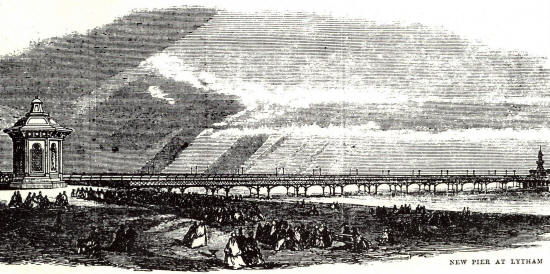
The place has had one drawback, Its facilities of communication with the
manufacturing districts, and indeed with every part of England, by rail, are all that could be
desired, and there is a line by the coast connecting it with the sister watering place of
Blackpool, but except at high tides Lytham was not accessible from the sea, and even when the tide
flowed to the Lytham beach and made the estuary of the Ribble a broad and noble sheet of water,
there was no convenience for the landing or embarkation of passengers; hence many who would gladly
have enjoyed a sail down the beautiful Ribble from Preston, were prevented visiting Lytham by
steamer, and for the same reason there was little traffic between Southport and Lytham, and Lytham
and Blackpool.
To remedy this state of things the erection of a pier at Lytham has more than
once been suggested. Southport has had one many years, and financially it has proved a good
speculation. Blackpool has had one a couple of years and it has done well for its shareholders.
When the one at Blackpool was found to be so successful, it was felt that the erection of one at
Lytham was a "necessity" apart from the notion that it was the duty of Lythamers to provide what
other watering places bad done, and so " keep pace with the times," it was considered that the
construction of a pier would not only furnish an agreeable and healthy promenade, but would cause a
vast amount of traffic between the three Lancashire bathing places which would be then placed
within reach of each other, irrespective of tide.
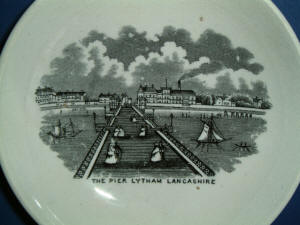
The project did not, of course, receive unanimous support. Some considered that
there were not sufficient visitors to Lytham to make it pay; some alleged that Lytham had a
promenade commodious enough in its broad beach; some, notwithstanding that the Blackpool pier has
stood; on that exposed coast, two rough winters uninjured, declared that one would not stand on the
sheltered coast at Lytham ; others prophesied that if it was built, the first coaster coining up
the river at high tide would sweep a lot of it away, and there was also an ebullition of the spirit
of old "fogyism," which flourishes at a genteel watering I place as much as any where else, which
saw in the movement an attempt to “induce" visitors to come to Lytham, and bring a few of the
humbler race of mankind to enjoy the pure sunshine and air, which some people think, or at least
act as if they thought, ought to belong to the rich alone. The railway, when regarded through the
spectacles of fogyism, was regarded with terrible forbodings, and, it was said, would swamp the
place with "the canaille", and so it world be shorn of all pretensions to "respectability;" but
Lytham progresses in favour with the well-to-do, as its accommodation is extended, and, year by
year, adds to the number of its elegant villas. Those who shook their heads and pooh-poohed the
pier project were not able to stop it.
Many enterprising gentlemen in Lytham warmly took it up, and several in Preston
and other places approved of the notion, and when Mr. E. Birch, C.E., of London, the engineer of the Blackpool and
various other piers, submitted a plan and estimate for a pier at Lytham, the shares were
subscribed for without the issue of a single circular, prospectus, or advertisement, or the
payment of a single penny by way of " promotion money' or commission for obtaining subscription
to the shares, a striking contrast with the way in which, in this era of joint stock
enterprises, so many public companies are launched. Colonel Clifton, the lord of the manor, met
the proposals of the promoters with great liberality, and granted the land for the pier and its
approaches at a nominal rent.
The requirements of the Admiralty, the Board of Trade, and the Ribble Navigation
Company, with the view of preserving the navigation of the estuary from encroachment; were also
arranged without difficulty. Last spring the company was organised, arid it was hoped the structure
would have been ready for "opening" last season, but various delays occurred. The work was let to
Messrs. Laidlaw and Son, of Glasgow, the contractors for the Blackpool pier, and the first pile was “screwed" by the directors in June
last. There were even then hopes that the later summer visitors at Lytham would have been able
to see the pier inaugurated, but the contractors were not able to accomplish this. It will
however be fully completed for the season of 1865; indeed, it is now, with the exception of the
"dolphin" or landing stage at the sea end of the pier, finished, and was opened to the public
with great ceremony on Monday last.
The site of the pier is in a line with Dicconson Terrace, and from that
street, and also from every part of the Beach, the pier is seen to advantage. It is of lighter
construction than the one at Blackpool, for the wind and waves are not quite so boisterous on the
Lytham coast as at Blackpool. It is not so long as that at Blackpool either, as had it gene farther
out it would; 'possibly, have interfered with the navigation. It is, however, generally admitted to
be a more elegant structure than the one at Blackpool, and it has one advantage over its neighbour,
in its elegant gates and toll-houses being seen along the whole esplanade facing the
Beach.
The pier is wholly of iron. Starting from the most central part of the
esplanade, it extends into the sea 914 feet- The entire structure is supported upon 126 iron
columns, screwed into the solid clay.
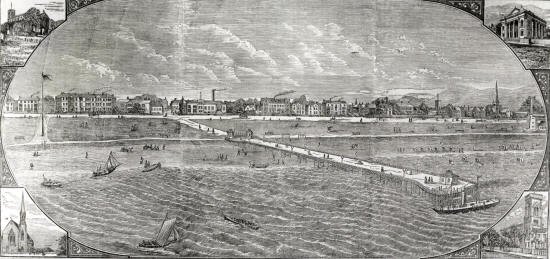
The clusters of columns for the main body are placed at intervals of 54 feet,
and spanned over by iron lattice girders, the whole being braced both diagonally and horizontally
by tie rods and wrought iron braces. The total amount of iron used in the structure is about 300
tons. The width of the pier is not uniform throughout, the object having been both to secure
accommodation for sitting and promenading, and also to avoid monotony in the appearance of the
structure. The width of the pier at its junction with the esplanade is 120 feet, and taking a curve
inwards is decreased to a width of 28 feet, which is joined to the main body of the pier.
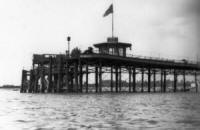
The main body of the pier is 20 feet in width between the rods, and at intervals
are placed circular balconies, which will very much add to the comfort of the visitors. The head of
the pier is in length 100 feet, the width increases from 28 to 60 feet at its extremity, where
there is to be placed a landing stage, with all necessary appliances and conveniences for landing
or embarking passengers from steam vessels, pleasure boats, or yachts. On the dock of the pier head
is placed an ornamental shelter house, surmounted by flag staff and light.
The approach to the pier from the town consists of an excellent asphalted road
leading to the entrance gates on either side of which are the necessary passengers' indicators and
toll-houses. The total area for promenading is about 20,000 feet square, and it is estimated that
this is capable of accommodating from 4,000 to 5,000 people. A continuous seat extends all round
the pier, which will enable about 1,000 people to sit down comfortably.
The cost of the structure is £5,760; the capital of the company is £6,000, which
has been raised in 1,200 shares of £5 each.
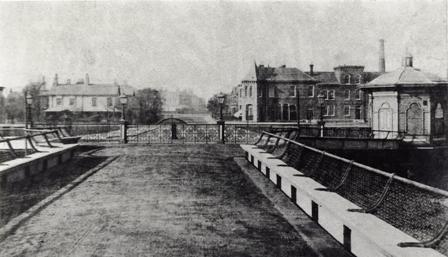 In order to celebrate, in a suitable manner, the
inauguration of " the last, but not least," of the many improvements which have marked the
progress of Lytham of late years it was determined by the directors to invite Mrs. Clifton, of
Lytham Hall, to take part in the opening ceremony. That lady, at once, and in the kindest
manner, accepted the directors' invitation, although at much personal inconvenience. The
Lytham corps of riflemen intimated their willingness to ' turn out' in honour of the event,
and their gallant brethren of Rossall expressed their desire to meet their associates in arms
on the occasion. The members of the various Lytham benefit societies resolved on having a
demonstration on the day, and to add to the attractions the crew of the Lytham Life Boat
promised to muster and have a cruise. The directors of the Ribble Navigation Company were
invited to be present on the occasion, as the pier is within their jurisdiction, and will, no
doubt, tend to the development of a branch of traffic, which the want of conveniences for
landing at Lytham has, all along, prevented. The Mayor of Preston promised to attend in his
official capacity, and with the paraphernalia of municipal dignity. The directors and
officials of the railways connected with Lytham were also invited, and it, was soon seen that,
should the weather be fine, the clay would be one to be long remembered in the annals of
Lytham. In order to celebrate, in a suitable manner, the
inauguration of " the last, but not least," of the many improvements which have marked the
progress of Lytham of late years it was determined by the directors to invite Mrs. Clifton, of
Lytham Hall, to take part in the opening ceremony. That lady, at once, and in the kindest
manner, accepted the directors' invitation, although at much personal inconvenience. The
Lytham corps of riflemen intimated their willingness to ' turn out' in honour of the event,
and their gallant brethren of Rossall expressed their desire to meet their associates in arms
on the occasion. The members of the various Lytham benefit societies resolved on having a
demonstration on the day, and to add to the attractions the crew of the Lytham Life Boat
promised to muster and have a cruise. The directors of the Ribble Navigation Company were
invited to be present on the occasion, as the pier is within their jurisdiction, and will, no
doubt, tend to the development of a branch of traffic, which the want of conveniences for
landing at Lytham has, all along, prevented. The Mayor of Preston promised to attend in his
official capacity, and with the paraphernalia of municipal dignity. The directors and
officials of the railways connected with Lytham were also invited, and it, was soon seen that,
should the weather be fine, the clay would be one to be long remembered in the annals of
Lytham.
Monday morning came, and there was at an early hour a slight shower. A few
patches of blue were then seen in the sky, and when the principal trains left Preston and Blackpool
there was a reasonable probability of the rest of the day being, at least, fair. The trains were
accordingly heavily laden, and when the visitors arrived at Lytham they were much pleased with the
aspect of the place. Flags were flying in various directions, hands of music were playing their
liveliest airs, officials of benefit societies were arranging for marshalling order, and
scarlet-coated riflemen were being drilled preparatory to forming a guard of honour. The pier, the
great centre of attraction, was bedecked with scores of flags, and looked as gay as hands could
make it.
About eleven o'clock the members of the Talbot Clifton Lodge of the Independent
Order of Oddfellows, the Lytham Lodge of Druids, and the Lytham Lodge of Mechanics met in the
Market-place, and perambulated the streets of the town, arriving about twelve o'clock at the pier,
along which they were ranged in hues. The Lytham and Rossall riflemen had a short procession and
drill, headed by their respective bands, the former being under the command of Lieut. Hincksman,
the latter under the command of Captain Clarke. They then took up their stand as a guard of honour
from Dicconson Terrace to the pier.
The principal procession was formed at the Assembly-rooms. It was headed by the
band of the Third Royal Lancashire Militia, under the leadership of Mr. Jasper Norwood, and they
played, in good style, many appropriate airs. They were followed by Mr. Thomas Butcher, who
officiated as marshal of the procession. After him came the portly halbardiers of the Corporation
of Preston, and the macebearers of that body, followed by the Mayor in his robes of office, and
accompanied by the Recorder, the Town Clerk, the Borough Treasurer, and several aldermen and
councillors; then followed the, directors of the Ribble Navigation Company; Captain Barstow, R.N. ;
the clergy of Lytham and the neighbourhood. At the end of Dicconson Terrace, Mrs. Clifton and
Captain Clifton, having driven from the hall, alighted and joined the procession, and were followed
by a number of ladies. Then came the directors of the Lytham pier, followed by the representatives
of the Lancashire and Yorkshire Railway, the directors of the Blackpool and Lytham Railway, the
directors of the Blackpool pier, some of the officials of the Southport pier, and other
visitors.
The procession passed along the road to the pier, between the rows of volunteers
and to the end of the pier. Then it returned, and halted at the entrance to the pier. There Mr.
Murton, chairman of the directors to the Pier Company advanced, and addressing Mrs. Clifton, said
:— Mrs. Clifton, we have had the pleasure of erecting this pier, and we shall be very much obliged
to you if you will declare it open to the public-—
Captain Clifton, son and heir of Colonel Clifton, of Lytham Hall, here stepped
forward and said :—On behalf of Mrs. Clifton, I declare this pier to be open to the public, and may
it be prosperous. The declaration was followed by hearty cheering, and the militia band played the
National Anthem. Cheers were given for Mrs Clifton and for the Lytham Pier Company, and Mr. Murton
said :—On behalf of the pier directors, I have to thank you, Mrs. Clifton, for opening this pier.
May it be a source of benefit and amusement for many days to come to all who may visit
it.—(Cheers.) The Mayor of Preston proposed three cheers for Captain Clifton, which were given
accordingly. —Afterwards the procession was re-formed, and those joining it proceeded to the
Clifton Arms Hotel.—
The ceremony in connection with the opening terminated about half-past one
o'clock, and immediately there was a rush of persons anxious to go on pier. The charge was a penny,
and visitors continued to flock on until between four and five o'clock, when the weather, which had
been fine since early morning, with the exception of a passing shower, broke. There was heavy
thunder, and a fearful fall of rain, which cleared the pier of the visitors, and the weather never
cleared up during the evening sufficiently to allow of company again enjoying a promenade on the
new structure, and caused many persons to leave Lytham earlier than they would else have done.
Notwithstanding this drawback, the receipts were £201s. 7d, which represented 4,817 visitors; this
was in addition to several payments for season tickets.
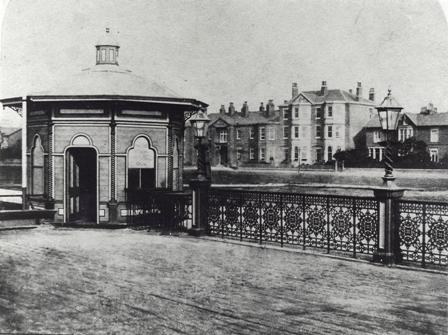
After the conclusion of the opening ceremony, the directors of the company and a
number of invited guests took luncheon together at the Clifton Arms Hotel. About one hundred
partook of the repast, which was of the most recherché character, and which was served in Mr.
Knowles’s new coffee-house, being the first day of its opening- to the public. Mr. Murton, the
chairman of the directors, presided, supported on his right by Mrs. Clifton, and on his left by
Captain Clifton, Mr. T. Fair occupied the vice chair. Amongst the company were the Misses Wilson,
the Rev. R. B. Robinson, the Rev. R. Moore, Mr. Fair, the Rev. J Arrowsmith, the Rev. R. and Mrs.
Thistlethwaite, the Rev, G. and Mrs. Brown, the Rev. A. and Mrs Jenour, the Rev. R.S. and Mrs.
Stoney, the Rev, J. H. and Mrs. Podmore, Captain and Mrs. Barstow, Mrs. T. Fair, the Mayor of
Preston, the Recorder, Town Clerk, and Borough Treasurer ; Dr. Spencer, Mr. G. Smith, Mr. S. Smith,
Mr. E. Birley, Mr, T. L Birley, Mr. and Mrs C. Birley, Mr. and Mrs. R. Moore, Mr. and Mrs. J. H.
Kay, Mr. and Mrs- E. Wilson, Mr. Birch, Mr, Laidlaw, Mr. Blackmore, Mr. M. Satterthwaite, Mr. R.
Rawcliffe, Mr. W. Dobson, Mr. D. Wilcockson, Mr. S- Simpson, Mr- J. Robinson, Mr. H. Sharples, Mr-
R. C- Chew, Mr. R. Cookson, Mr. J. Isherwood, Mr. Kelsall,
The CHAIRMAN, having given the usual loyal toasts, which were duly honoured,
proposed "The clergy of all denominations—(applause) -- and called upon the Rev. R. B. Robinson,
the incumbent of Lytham, to respond to the toast..
The Rev. R- B. ROBINSON responded. After thanking the company for drinking the
toast, he said he believed the clergy would never prove deficient in any spiritual or temporal
matter. That day there had been nothing spiritual or religious about the ceremony they had
witnessed. It had been purely temporal. But they had been in good company. Amongst the visitors
present was the Mayor of "proud Preston-" Long might Preston retain that name—for its manufactures,
its works, and other matters connected with it. The Mayor visited the pier in his-robes of office;
he also noticed the Recorder ; and he noticed the regalia of the Corporation preceding the
procession. He did not know whether the Mayor threw a ring into the Ribble like the Dodge of Venice
to espouse the river.—(Laughter.) He did not know whether bra worship had a wife, but if he had
none, or having had one had lost her; and intended taking a second one, he begged and entreated of
him not to take the Ribble—for it would turn out a most unruly and expensive partner —(laughter)—
and although he might have a very long puree, he would have to dip his hand very deeply into it to
pay for all expenses and encroachments that the Ribble constantly Made on her neighbours.—(Hear,
and laughter,) She was like a bed wife—always meddling with other people's business, always
overflowing her banks, and trying to take more than she had a right to.—(Laughter.)
They had various other celebrities present—the directors of the various
companies of the neighbourhood—Lancashire and Yorkshire and Lytham and Blackpool Railway Companies
the Blackpool and Southport Pier Companies Etc.; and they were accompanied by a lady known to all,
and beloved and respected by all, and if the pier which had been opened that day was founded on the
same truthfulness and excellence of character as hers, it would, he thought, not only yield a very
good dividend, but last for many years.—(Applause.) They had also been accompanied by two corps of
volunteers-he loved the volunteers; because ho thought they had done more good to this country than
nearly any other institution, and he should indeed be sorry to see them flag for the sake of
wanting the assistance of their honorary members. He entreated all of them never to stand aloof
from, but always to help forward, the volunteer movement. There were many other persons present
that day—amongst them several officers, whom they were very glad to see, After a few further
observations- the rev. gentleman concluded amid applause.
The Rev. R. MOORE, vicar of Lund, being loudly called for, also briefly
responded. He expressed his pleasure at being present at the opening of the pier, and hoped it
would prove a success.
The CHAIRMAN proposed "The Army, the Navy, the Militia, and the 'Volunteers."
After a brief allusion the services of the army and navy, the chairman said he did not see any
Officer of the regular army present, but they had one connected with the, navy—Captain Barstow —and
also some of the volunteer officers. He concluded by coupling the name of Captain Bairstow with the
navy and that of Captain Clarke with the volunteers:
The toast was warmly drunk.
Captain BARSTOW responded. He said that if this country should ever again be
embroiled in a war, and if any failure took place, he did not think it would, be attributable to
the personnel, but 'the materiel, It was
impossible in these changing times to tell what might take place. Every now and
then armour-plates defied the guns, and then they got guns which broke the armour-plates, and he
did not see, unless they got floating rocks, where they would stop. He begged to return his sincere
thanks In behalf of the navy for the toast which the company had drunk-
Captain CLARKE also responded.
The CHAIRMAN said the next toast he had to propose was one which he regretted he
had not more eloquence to lo justice to; it was that of Colonel and Mrs. Clifton— Applause.) They
regretted very much that Colonel Clifton was prevented from being with them that day. He tad been
kind enough to let them have the land for the pier at a merely nominal rent, and he was also a
shareholder. He bad no doubt it would have given Colonel Clifton great pleasure to have been with
them that day, but circumstances had prevented it. He was very glad to be able to say, from what
had been told to him, that Colonel Clifton was recovering his health, and that they night hope to
see him again among them with restored energy.—(Applause-) He might say, from the universal respect
in which his character was held, and for his kindness, his truth, and his honour, which had always
been unimpeached, that he stood very high amongst them, end they would have been very glad indeed
to see him amongst them.
With regard to the other portion of the toast—the health of Mrs. Clifton—perhaps
his difficulties were even greater- They well knew that high rank and great riches entailed great
responsibilities end serious duties, and he thought that a serious sense of her duty towards the
inhabitants of Lytham was the cause of her presence that day. When it was intimated to Mrs. Clifton
that, from various circumstances Lytham was not in a prosperous state—that through suffering in the
autumn, the presence of an epidemic, and a very long winter, many of the inhabitants of Lytham,
dependent upon visitors, were in a state of depression, and that her presence might tend to
alleviate them a little, she at once waived all personal considerations —and he was sure she must
have waived a great deal—and agreed to take part in the proceedings of that day.—(Applause.)
Nothing but a strong sense of duty could have prompted her to have done so. But
that was not the first time they had experienced in Lytham the effects of Mrs. Clifton’s sense of
duty. They had found on various occasions she had come forward to help them, and she had done this
particularly in regard to the volunteers-—(Hear, hear, and applause.) The volunteers, he believed,
had never had an opportunity of thanking her for the very distinguished part she took in the bazaar
which was got up on their behalf. But he was sure that on all occasions she was equally ready to
lend her aid and services towards anything which had the welfare of Lytham for its object. And here
perhaps he ought to stop. But he had another word or two to utter.
In their parish church was an inscription relative to a former Mrs. Clifton. It
was dated 1760, and it said —" Here lies the body of Ann, wife of Thomas Clifton, of Lytham, who
died at Lytham." Then the date followed, and afterwards these words—" Her name shall live to future
ages. In her was seen whatever is amiable in the daughter, wife, mother, friend, and Christian, and
a pattern to all her sex—Oh man, admire! Oh woman, imitate!" This old character was somewhat
quaint, but those who had had the satisfaction of living in the present day knew that such a fine
character was not impossible without flattery and without exaggeration. He believed that the Mrs.
Clifton of the present day was one who shrank instinctively from courting popular applause, was one
of those who
Do good by stealth, and blush to find it fame.
Still, from the glimpses of her character that they were permitted to gather
from beneath that feminine reserve which shrouded her actions, they might say of Mrs. Clifton, " A
pattern to her sex ; oh man, admire; oh woman, imitate."—(Applause.) They could not promise to Mrs.
Clifton that her name should live to future ages, but this they could say—that when the was called
to a higher sphere, from trials endured with fortitude, from work well done, and from labours
conscientiously discharged upon earth—when that call came, and for their sakes might it be
late—Mrs. Clifton would live in the grateful memory of her people.—(Loud applause.) He gave the
healths of Colonel and Mrs. Clifton.
The toast was enthusiastically received.
Captain CLIFTON returned thanks on behalf of his father and mother. He was sure
his mother felt highly gratified in being selected to take so important a part as she had done that
day in the ceremony of the opening of the pier. He was certain that she felt the greatest
satisfaction at what had been done, and that she gave every praise which was due to the energy of
the inhabitants of Lytham in completing the work. His father deeply regretted his inability to be
present with them that day. On looking at the card which had been put into his (Captain Clifton's)
hand be had found it had fallen to his lot to propose a toast which he considered to be the toast
of the day; it was “Success to the Lytham Pier."—(Applause.)
He thought that at that period it would not be out of place if he gave them a
few particulars about the pier, such as its length and breadth, the cost, and the number of people
it was capable of accommodating. The length of the pier was 914 feet. Its breadth was 20 feet, and
it was capable of accommodating between 4,000 and 5,000 people, 1,000 of whom could be seated. The
total cost, of the pier had been £5,860. If they looked around England they would find different
watering-places where it had been thought a pier would be an advantage—such as Ryde, Brighton,
Margate, Southport, and Blackpool—and that at all of these places the piers had paid excellent
dividends. At several other places, piers wore in the curse of completion. He would not, however,
further trespass on their time, and would simply give them, " Success to the Lytham
Pier."—(Applause.)
The toast was drunk with “three times three,"
The Chairman, in acknowledging the toast, said he believed that with many of the
shareholders the success of the pier, as a commercial speculation, had not been the first
consideration. He thought it was got up first out of a consideration that it would be a benefit to
the town of Lytham, and be a source of pleasure and amusement to those visitors who might favour
the place with their company, and who had sometimes complained that Lytham had no attractions.
—(Hear, hear.) He believed that ultimately there would be a “dolphin” erected at the end of the pier, by means of which parties could
land or embark at all times of the day. Already a gentleman had undertaken to put three steamers
upon the water, so that there would be not only regular communication with Southport and
Blackpool, but opportunity for sailing in the neighbourhood. And no doubt there would he many
private boats which would tape advantage of the pier. There was an old nursery rhyme to the
effect that these children who slided upon dry land would never be drowned.—(Laughter.) It was
the same with the pier. They did not conceive that there was any doubt in the matter as to its
success- It was very agreeable- when pleasure could be combined with profit. Their secretary
talked of putting at the head of the pier a reading room, which had been a great want at Lytham.
And if he only did so, he had no doubt that ix would be very well supported.—The chairman
concluded by thanking the ladies and gentlemen asscmbled for their attendance and for their kind
wishes for the success of the pier.
Mr. FAIR said it had fallen to his let to propose the next toast. It was the
health of the Mayor and Corporation of Preston.—(Applause.) He had great pleasure in submitting
this toast, because he thought that very few words would be required from him to ensure for it a
warm and cordial reception at the bands of those present. He was very glad to find that they had
not only the Mayor of Preston, whose personal acquaintance he had not previously had the honour of
making, but also the ex-mayor and many of the aldermen and members of the Corporation of Preston.
That circumstance was extremely gratifying to him as an inhabitant of Lytham, and it showed the
good feeling existing between that place and Preston, which he was sure all his neighbours felt and
appreciated. There were not only the mayor for the time being, the ex-mayor, the aldermen, and the
members of the council present, but lie also saw their valued and highly esteemed friend Mr.
Addison, the Recorder of Preston.—(Applause.) He also saw the able and talented Town Clerk of
Preston. — (Applause.) Under these circumstances he thought that very few words would be required
from him to ensure the toast a very warm reception. He had great pleasure in proposing the health
of the Mayor and Corporation of Preston, and he thanked them for attending so numerously that
day.—(Applause.)
After the toast had been drunk,
The MAYOR OF PRESTON said he should appear more ungrateful than he desired to be
if he were to lose one moment in rising to express thanks to the company for drinking the last
toast. He considered it an honour—he esteemed it an honour—and he felt it to be a great pleasure to
have the opportunity of taking part in the interesting proceedings of that day. When the matter was
first proposed he felt the connection between Preston and Lytham, and the important connection of
its very noble river, made it desirable, if it could be done with propriety, that all the éclat
which the Corporation regalia and the attendance of the members of the Corporation could lend
should be given to the occasion. He felt, therefore, very much pleasure indeed, to have the
company—and he might say the willing company—of those officers who were present. Mr. Addison, in
the very kindest manner, when the matter was mentioned to him, consented to go down to
Lytham—(hear, hear);—the Town Clerk, the Borough Treasurer, and others also expressed their
willingness to be present.—(Applause.)
Their excellent friend, the Rev. Mr. Robinson, thought it necessary to give a
caution that if he (the Mayor) was not provided with a wife he should avoid the Ribble, as it would
constitute a very boisterous, unruly partner.—(A laugh.) He was happy to say he was fortified on
that point.—(Laughter.) He thought if he had deferred until that moment the choosing of a wife, he
should not have been there as the representative of the Corporation of Preston. He believed the
Corporation had the good sense not to elect a bachelor-he did not mean by this any offence to their
worthy friend the Recorder — (laughter)—and he hoped that they would always adhere to that
rule.—(Hear, and laughter). He (the Mayor) took care many years ago to select a partner. They were
on that occasion in the company of a gentleman (Mr. Alderman G. Smith), who obtained the
appointment of a committee last week to control the unruly qualities of the Ribble. He hoped the
members of that committee would succeed in restricting that unruly river, and that it would be a
blessing, as well as an immense advantage, to Preston and Lytham .—(Applause. )
The CHAIRMAN gave the health of Captain Clifton. He hoped it might be long
before Captain Clifton came into possession of the Lytham estate, although he had every reason to
believe that when he did so he would prove to be a kind landlord and a good neighbour.—(Applause.)
Captain CLIFTON returned thanks. He said he had experienced great pleasure in witnessing the
inauguration of the pier that day, and he hoped it would prove a great success.—(Applause.)
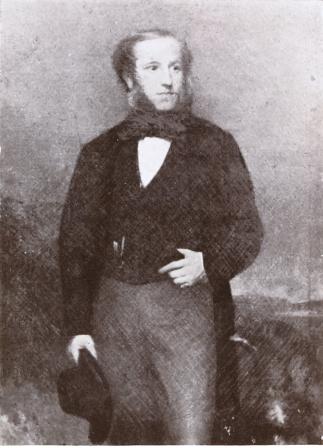
Mr. Alderman E. BIRLEY did not expect, when he entered that room, being called
upon to propose a toast. He had lived in that neighbourhood all the years of his life, and he could
recollect visiting Lytham when a boy, when the place was merely a fishing village, and when all the
transactions carried on in it had reference to a few shrimps or something of the same sort.--(Hear,
and laughter-) If they contrasted that time with the present they would all agree with him that the
inhabitants of the locality and their late spirited proprietor, as well as the present owner of the
Lytham estate, and his worthy agent, had done everything they possibly could to promote the
prosperity of the town.---(Applause.)
He would direct their attention for one moment to this fact—that in former times
the roads were very bad, and Lytham could scarcely he reached—could not be got to without the
greatest difficulty. Now, Lytham was connected by railway with all parts of the country, Of late
years Lytham had had the advantage of a local act of parliament, by which many things adding to the
prosperity of the place id been accomplished. All of them were aware of the my extensive promenade
and the large public building containing baths, &c., which bad been erected during the last few
years ; and that day they had accomplished a task requiring no ordinary zeal on the part of those
who had been concerned in the undertaking—that day they had opened a new pier.—(Applause.) Lytham
had many advantages which other places in that neighbourhood did not possess. It was in the
possession of one proprietor, ad they saw the advantage of that in the regularity of its buildings,
which contributed so much to its appearance- he hoped that Lytham might go on prospering, and that
the new pier might realise the anticipations of its most sanguine promoters.—(Applause.) He had
great pleasure proposing, as the next toast, "The town and trade of Lytham."— (Applause.)
Mr. EDMONDSON responded. There were, he said, few places situated so favourably
as Lytham. With regard to the trade of Lytham, perhaps it was not of such importance as to require
him to take up any part of the time of that assembly in an exposition of it, He bad no doubt that
the new pier would add much to the prosperity of the place.
The Rev. R. MOORE observed that there seemed to be an omission in the programme
of toasts, which he should e very happy indeed to fill up. After a facetious allusion to the
proposed reading-room at the end of the pier, the Rev. gentleman said he congratulated all who had
been concerned in the new pier movement, in bringing it to so favourable a state of completion. He
had known the locality for nearly half a century; he had seen it in its infancy ; he had seen new
works begun and carried out ; he had seen the place gradually progress ; and he trusted hey would
go on in the work of improvement. They night depend upon it there was nothing like progression.
They must go forward. They could not stand still. He complimented the chairman on the admirable
manner in which he had presided over that meeting, and proposed “The health of the Chairman."
Toast appropriately drunk.
The CHAIRMAN returned thanks. He trusted that Lytham would continue to progress,
and that men would never be found wanting to carry out improvements for its benefit.
Mr. D. WILCOCKSON gave, as the next toast, "The Ribble Navigation Company." He
was glad to see so many gentlemen connected with the company present that day. He quite agreed with
the Rev. Mr. Robinson that the Ribble should not be allowed to overflow its banks so much; and that
it should be kept within bounds. He trusted that its resources would be fully developed, and that
it would be made more prosperous than it had been in the past.—(Applause.)
The toast was drunk amid applause.
Mr. Alderman SPENCER responded. He regretted the absence of the chairman and
vice-chairman of the company, because he was sure that, had they been present, they would have been
much better able to respond to the toast than be was. He was sorry to say that the observations
which had fallen from the Rev- Mr. Robinson had so unnerved him—(laughter)—that it would require
more than an ordinary effort to stand in his present position and support a river which, it was
said, had been so extraordinarily insubordinate. —(Applause.) He was glad that he had had an
opportunity of watching its prosperity and progress for many years during that period he had never
found it so insubordinate, nor so bad to manage, as Mr. Robinson had represented It to be. [The
Rev. Mr. ROBINSON: You don't live at Lytham.] He thought the course the directors had taken had
just been that which he trusted the Rev. Mr. Robinson would in future follow, namely, to coax, and
not to coerce.—(Laughter and applause.)
He had the pleasure of informing that meeting that the progress of the river had
been most satisfactory. The quantity of water flowing up at each tide was considerably more than it
was formerly, and, what was more than that, its progress had been considerably accelerated.
Therefore, he trusted that in proportion as the directors proceeded with their improvements, so
would be the prosperity of the river. He also hoped that it would confer great advantages upon the
visitors and inhabitants of Lytham. It would ill become him to enter into any details as to the
river ; but he thought it would be out of place were he not to congratulate the chairman of the
Pier Company, and also the honourable house of Clifton, upon the progress which had been made in
Lytham during the last few years. He thought they had great cause to be proud of the structure
which had that day been inaugurated. He considered it was one of the handsomest piers in the north
of England, and he hoped it would prove as successful as those which had been erected at other
watering-places.—(Hear, and applause.)
He also begged to congratulate the authorities of that little village—he hoped
the day was not far distant when it would be a monster watering-place—on what had thus far been
accomplished in it. Much had been done for the improvement of its sanitary condition. Their
sewerage was good ; their waterworks were super-exceller ; and ho hoped the same spirit which had
induced the inhabitants or Lytham and the gentlemen of the Fylde district to go on so far, would
cause them to proceed in other respects in the same ratio as other towns, He hoped that when he
next had the pleasure of being present at such a gathering as that, it would be for the purpose of
inaugurating and opening some public dispensary or infirmary, which would be a great advantage not
only to the inhabitants of Lytham, but to those of the whole district of North Lancashire.—
( Applause.)
Mr W. DOBSON had pleasure in proposing the health of the engineer, Mr. Birch,
and the contractors Messrs. Laidlaw and Sons, and, on the part of the directors, he expressed their
satisfaction with the structure. He referred to the great changes which had taken place of late in
Lytham, and said be had no doubt that the pier, the last public work inaugurated, would be of great
benefit to the town, and induce more visitors to come, as it would increase the facilities for
persons coming there, and then means of enjoyment while at Lytham.- (Applause.)
BIRCH and Mr. LAIDLAW each responded.
The CHAIRMAN alluded to the valuable services of Mr, Thomas Fair, as secretary
to the company since its formation, and proposed his health.---( Applause.)
Mr. T. FAIR returned thanks. What little, he had done, had given him the
greatest pleasure. There might la differences of opinion as to the pier, still he thought that all
works of public utility must advance the progress and tend to the benefit of the places wherein
they were constructed. The pier project at Lytham had met with great favour, for when started all
the shares were taken up before the company had even beau made publicly known. That circumstance
must, he thought, be a source of great satisfaction to all connected with the pier.
Mr. SATTERTHWAITE proposed the health of the visitors, and coupled with the
toast the name of Mr. Addison recorder of Preston.—(Applause.)
Mr. ADDISON returned thanks, and alluded to the changes which had taken place at
Lytham during the time he had known it, having been in the habit of visiting it during four
generations of the Clifton family, and he hoped it would continue to prosper when the young
gentleman who was with them that day had succeeded to the estates of his ancestors.
Mr. FAIR said that among the many public works projected in the Fylde, he knew
none calculated to be of such advantage as the Fylde Waterworks, which were now operation, and
winch, he believed, were destined to achieve great benefits for Lytham and the rest of the Fylde.
Lytham had long suffered from the want of good water, and it was now supplied with water of the
first quality, and abundantly. He coupled with the toast the name of has friend Mr. T. L. Birley,
who had taken great interest in the undertaking-
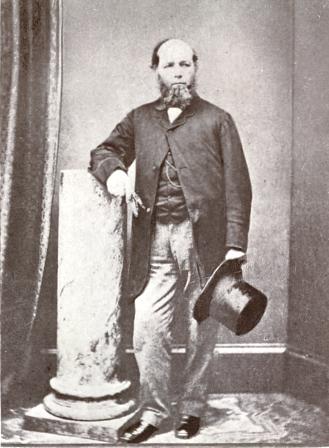 Mr. T. L. BIRLEY said he was glad to say the
work were now in full operation, and supplying the Fylde towns most satisfactorily. He had
joined in the work from a belief that it would be a blessing to the Fylde; he believed it
would be so, and also a benefit to the share holders. Mr. T. L. BIRLEY said he was glad to say the
work were now in full operation, and supplying the Fylde towns most satisfactorily. He had
joined in the work from a belief that it would be a blessing to the Fylde; he believed it
would be so, and also a benefit to the share holders.
The CHAIRMAN proposed "The town and trade of Preston," which was acknowledged by
Mr. E BIRLEY.
"Success to the Blackpool and Southport Piers," and acknowledged by Mr. R.
Radcliffe; “The health of Mr Fair;" "'The Lytham Improvement Commissioners," responded to by Mr.
Isherwood ; and " The Press," were then given, and the meeting dispersed, all highly pleased with
the way in which the proceedings had passed off.
The Lytham Rifle Corps dined together at the Assembly Rooms and the Rossall
corps at the school-room. The members of the various benefit societies dined together a their
respective Lodge-houses, and at all the places the proceedings were of a pleasant and convivial
character.
|